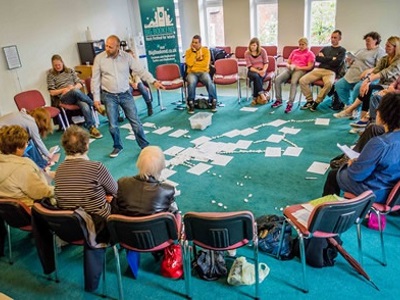Booking an author
This site is designed to help you locate and contact suitable authors. Once you've done that, you should book directly with them via the Booking Enquiry button on their profile.
We hope that you'll find the hints and tips below helpful, especially if you've not worked with an author before. In the unlikely event that you run into problems, please let us know so we can consider whether we need to add extra advice or discontinue a particular advertisement.
Before you get in touch
Before you contact any author, please read the information on their page carefully and, if you don’t already know their work, click through to the relevant entries on Amazon/Waterstones to make sure they write the type of books that will interest your audience. Make a note of anything you need to know that’s not clear from their page so you remember to ask about it when you contact them.
Also think carefully about what you want from them. How long do you want them to speak for? How large will your audience be? How much can you afford to pay?
If you decide to contact several authors to check prices and availability, please let them know if you decide not to use them. Otherwise they may be unsure about taking another booking for the date you requested.
Checking Suitability
We recommend that you check individual author's suitability for your specific requirements before you enter into any agreement with them. There are several ways to do this:
Paying an author
Authors are professionals so they expect to be paid for speaking engagements and workshops. It's a good idea to raise the subject of payment yourself when you contact the author. Either ask them what their rate is or offer a specific fee that you can afford.
A rough guide is £350 for a full day or £150-200 for a half day or single talk (plus expenses). Some authors charge more than this and some charge less, especially if they are attending a very local event, supporting a good cause or hoping to sell a large number of books. Make sure you check whether they are registered for VAT as, if they are, the final bill may be larger than you expect. (This may be less of an issue if your organisation or school is VAT registered because you'll be able to claim the tax back.)
Sometimes an author will agree to attend an event free of charge or at a very low rate in return for publicity for their latest book. If this happens, please make sure you give the book sufficient coverage and maximise publicity by telling the local paper .
Authors are self-employed and will usually invoice you for their services. They pay tax and national insurance independently and don't expect you to deduct these from your payment.
Refreshments and accommodation
If your event involves the author being at your venue during a mealtime, you should provide something to eat. Please check in advance whether they have any special dietary requirements.
You should also provide tea, coffee and/or soft drinks and make sure water is available while the author is speaking. However, it's best to treat alcohol with caution until after their talk. Although a glass or two of wine with a meal can calm some people's nerves, a whole bottle will knock the edge off even the most brilliant speaker.
If distance or the timing of your event means the author needs to stay overnight, you will need to organise accommodation. If you are running a residential event, this will automatically be available.
For non-residential events, you will need to book the speaker into a hotel. This works well as long as the hotel is good so check beforehand to make sure that it is. If the author is organising the hotel and claiming the cost as an expense, make sure you have agreed the price beforehand so you don't exceed your budget.
You may prefer the cheaper option of letting the author stay in your spare room or with someone else involved in the organisation. However this is far from ideal for the author. Staying with strangers is tiring and can make them feel they are constantly on duty. If local circumstances mean this is the only possibility you can offer, please check that it is acceptable before you make the booking.
Travelling expenses
It is usual to pay travelling expenses, unless the event is very local. Sometimes this is included in the author's fee, but often it isn't. To avoid any nasty surprises, agree in advance whether you are paying first or second class rail fare if the author is coming by train or, if they are driving, agree a set mileage rate.
Sometimes publishers can be persuaded to pay travelling expenses if the author's visit will promote their new book. Make sure you or the author ask them in advance – don't just cross your fingers and send them the bill after the event.
Selling books at an event
Members of the audience often like to buy a book by the speaker and have it signed. Some authors are very entrepreneurial and happily turn up with boxes of books which they sell. Others feel embarrassed at doing that and much prefer someone else to do the actual selling while they just sign the books.
If they don't want to supply the books, a local bookshop may be willing to do this for you. Alternatively you could organise the bookstall yourself, asking the author's publisher to supply you with copies on sale or return. They may be able to provide posters and other publicity material too. Make sure you arrange this well in advance - both publishers and bookshops need plenty of notice.
Even if the author is supplying the books, they will probably appreciate some help in taking the money so they have time to concentrate on signing copies. It's often a good idea to have a fixed period of time for signings, especially at longer events, to ensure they have time to eat lunch/have a coffee/go to the toilet.
Confirming the Booking
Please confirm all arrangements in writing. This can save embarrassing mistakes like the author turning up on the wrong day.
At the very least, the confirmation should state the date, the venue, the price agreed, the length and type of talk required and the type and size of the audience. Where appropriate, you should mention arrangements for travel, meals and accommodation.
Last minute checks
Contact the author to make sure they haven't forgotten your event or run into problems which may prevent them coming.
Confirm the equipment they would like provided – microphone, flip chart, facilities for showing a Power Point presentation, etc.
Make sure they know how to find you. Send them a map and details of where to park. If they are coming by train, arrange how they will get from the station to you. If possible, give them a mobile number to call if they run into problems en route.
Let the author know if there will be anyone in the audience with special needs, so they can take this into account in their planning. For example, it's sometimes possible to bring extra copies of pictures so anyone who can't see one held up by the speaker can have one on their lap.
On the day
Make sure someone at your end is organised to meet and greet the author.
Remember they may have had a long journey to reach you and be nervous about the forthcoming event. Offer them tea or coffee and show them where the toilet is.
Escort the author to the correct room. It's easy to get lost in a strange building.
Keep to the arrangements you have agreed. Don't try to add on extra sessions or change the topic of the talk at the last minute.
If your event is in a school, don't leave the author alone with the pupils. They are are not there as a substitute teacher. The children's usual teachers should be present during the talk to hear what is said and deal with any behaviour issues.
Commissioning a Book
If you want to commission an author to write a book for you, there are two ways to organise payment. The first is to pay royalties on each copy sold. These are a percentage of either the cover price or the price received. Usually you pay an amount of money up front which is an advance. No further money is due to the author until the book has earned that amount in royalties.
The second way is to pay a flat fee. This is simpler for you to administer, but less popular with authors as it doesn't let them share in the book's success. A compromise solution is to pay a flat fee to cover a set number of books and make further payments if you wish to print more.
The laws of copyright are complicated so it's important to handle the legal side of a commission properly. It's best to use a written contract that you have had professionally checked.
Do not expect to find an author to write your book without payment.
Make an enquiry today
We have a range of authors to make your event special. We help authors visit schools, libraries and organisations all over the world.
Book an Author
